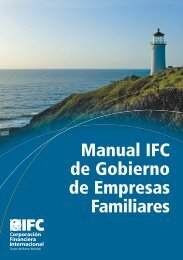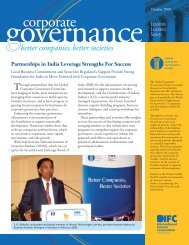Overview of Corporate Governance Issues for Co-operatives - IFC
Overview of Corporate Governance Issues for Co-operatives - IFC
Overview of Corporate Governance Issues for Co-operatives - IFC
You also want an ePaper? Increase the reach of your titles
YUMPU automatically turns print PDFs into web optimized ePapers that Google loves.
However Cuevas and Fischer identify some problems with the model proposed byWOCCU which contains a bias towards the Anglo-Saxon credit union experience ratherthan those <strong>of</strong> financial co-<strong>operatives</strong> which operate within a different set <strong>of</strong> co-operativetraditions (Cuevas and Fischer 2006) ‡ .This view is endorsed in a recent paper from theInter America Development Bank. Recognising that European and North Americancountries have functioning delegated credit union systems, they point out that <strong>for</strong> thedeveloping world this strategy has not proved successful, with a high number <strong>of</strong> failures.Self regulation, while attractive on budgetary grounds, carries within it an inherentconflict <strong>of</strong> interest as federations find it hard to discipline their own powerful members,<strong>for</strong> example (Janssen et al 2004).The nature <strong>of</strong> appropriate supervisory and regulatory frameworks <strong>for</strong> financialco-<strong>operatives</strong> in developing countries is the primary focus <strong>of</strong> the paper by Cuevas andFischer. They review the literature and debates but note the absence <strong>of</strong> sufficientdocumented evidence to reach any definitive conclusions on what should be the nature<strong>of</strong> the regulatory and supervisory framework. However there is a pressing need todevelop core principles to underpin the framework <strong>for</strong> CFIs in developing countriesanalogous to those already in place <strong>for</strong> investor-owned banks.The overall lack <strong>of</strong> research does make definitive conclusions difficult but it is possibleto identify some governance challenges specific to co-<strong>operatives</strong> in the developingworld. Major changes are occurring to the overall governance framework through there<strong>for</strong>m and liberalisation <strong>of</strong> co-operative legislation in an growing number <strong>of</strong> countries.The arrival <strong>of</strong> an enabling rather than controlling legal framework undoubtedly providesan unprecedented opportunity <strong>for</strong> co-<strong>operatives</strong>. However it also presents a majorchallenge and many co-<strong>operatives</strong> remain unprepared and ill-equipped to meet thechanges.The studies also confirm that good governance is central to the success andsustainability <strong>of</strong> co-<strong>operatives</strong> in the developing as much as the developed world.Improving board per<strong>for</strong>mance and accountability remains a central issue together withimproving engagement from the wider membership. However there are some issuesand challenges in terms <strong>of</strong> corporate governance that are specific to co-<strong>operatives</strong> indeveloping countries. These include extremely low levels <strong>of</strong> participation by women asmembers and in the governance structures in their co-operative. Secondly, there is aneed to develop appropriate training and support <strong>for</strong> directors in the context <strong>of</strong> relativelylow levels <strong>of</strong> literacy and related skills. In addition, conflict between members and theirboards also appear to be present. This has been fostered by long established practices<strong>of</strong> placing <strong>of</strong> government nominees on co-operative boards and related patterns <strong>of</strong>corruption.‡ In referring to WOCCU's model law, Cuevas and Fischer state: "In some aspects it reflects the United States, orperhaps more generally the Anglo Saxon, credit union experience rather than that <strong>of</strong> financial co-<strong>operatives</strong> under amore diversified cultural context. This makes the model unsuitable <strong>for</strong> other systems that respond to a differentcultural tradition or present organizational features that are in conflict with this law. Although WOCCU is careful toinsist that this model is just a guideline it is nonetheless very detailed in presenting a particular type <strong>of</strong> organizationand regulatory regime".Page 31


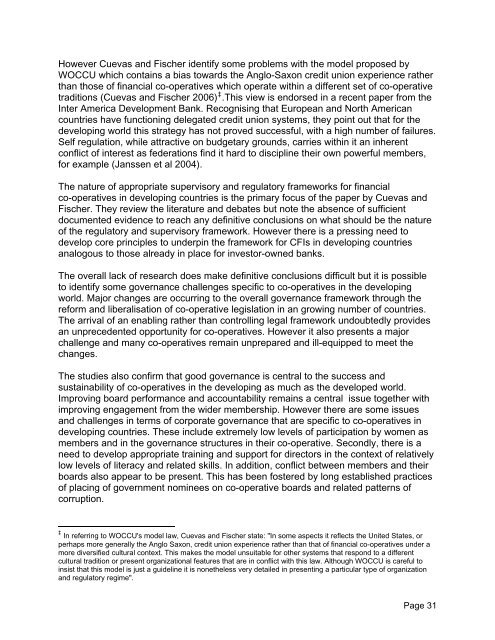
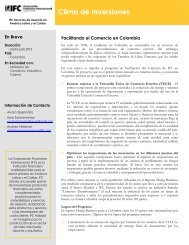
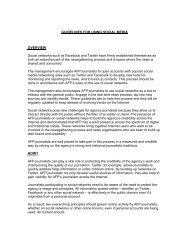
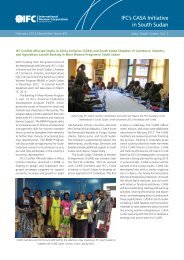
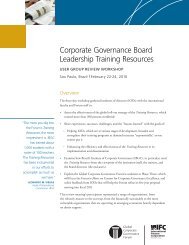

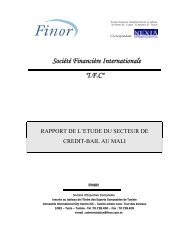
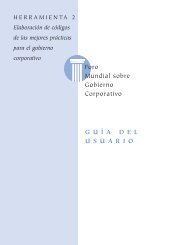

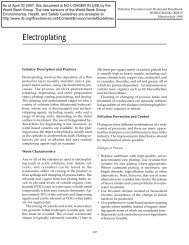
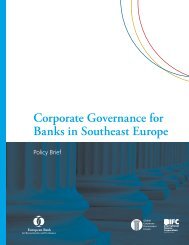
![Print a two-page fact sheet on this project [PDF] - IFC](https://img.yumpu.com/43449799/1/190x245/print-a-two-page-fact-sheet-on-this-project-pdf-ifc.jpg?quality=85)
